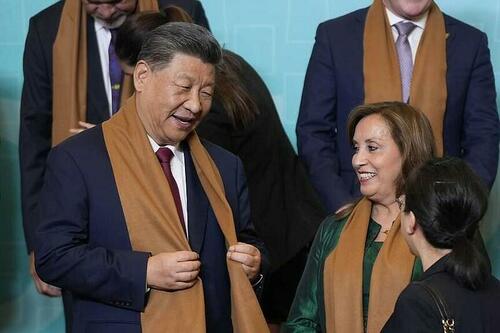
President-elect Trump is set to steamroll Chinese leader Xi Jinping's 'red lines' communicated to President Biden this weekend, likely to be on display from day one after he enters the Oval Office for the second time on Jan. 20. This is especially given his campaign promises impose a blanket 60% tariff on Chinese goods, touted as key to a package of "America First" trade measures.
Xi conveyed that he's willing and ready to work with the incoming Trump administration, during the meeting with Biden that took place on the sidelines of the Asia-Pacific Economic Cooperation (APEC) summit in Lima, Peru.
Xi told Biden: "The United States has recently concluded its elections. China’s goal of a stable, healthy, and sustainable China–U.S. relationship remains unchanged." But the optics at the Peru summit strongly suggest lame-duck Biden had long already taken a backseat in terms of assertiveness over US-China relations...
WATCH: Biden takes a back seat to other world leaders during an international trip, relegated to a corner spot in the traditional family photo of the world's most powerful figures, while China's president takes the prominent front-and-center position. pic.twitter.com/dyOkaPwqNW
— Fox News (@FoxNews) November 17, 2024
"China is ready to work with the new U.S. administration to maintain communication, expand cooperation, and manage differences, so as to strive for a steady transition of the China-US relationship for the benefit of the two peoples," Xi additionally conveyed to Biden. White House national security adviser Jake Sullivan in follow-up emphasized of the "candid" and "constructive" talks–sure to be the last held face to face of the Biden presidency, that Biden "has worked hard to responsibly manage the competition" with China over four years to prevent things from spiraling into conflict.
The some two-hour weekend meeting included what's being described as an olive branch from Xi, but more importantly a series of 'red lines' if Washington wishes to avoid a "new Cold War".
"A new Cold War should not be fought and cannot be won. Containing China is unwise, unacceptable and bound to fail," Xi told the American president.
President Xi broadly laid out four red lines as follows:
"The Taiwan question, democracy and human rights, China’s path and system, and China’s development right are four red lines for China," Xi was quoted as saying.
"They must not be challenged. These are the most important guardrails and safety nets for China-US relations."
It as especially on the Taiwan question that Xi spoke with firmness, and specifics, at one point mentioning Taiwanese president Lai Ching-te by name (a rarity). He reiterated that Beijing views Taiwan as an integral part of the country and thus that Mr. Lai based on his articulated policies is a "separatist". Xi further warned that the US "should not get involved in bilateral disputes over the relevant islands" in the South China Sea.
Xi said of his four red lines and the future of relations with the US, "Words must be trustworthy and actions must be fruitful. A person cannot stand without credibility. China always follows through on its words, but if the US side always says one thing and does another, it is very detrimental to America's image and damages mutual trust."

Again, these are the four red lines, which the Chinese leader urged Washington to avoid crossing, no matter the administration:
1) Supporting Taiwan independence.
2) Interfering in China’s democracy and human rights
3) Stifling China’s development path, e.g. by sanctions and trade restrictions.
4) Restricting China’s rights to advancement and development.
Below are more translated details of Xi's words, with some commentary by regional watcher and analyst Arnaud Bertrand.
* * *
According to the Chinese readout (https://guancha.cn/internation/2024_11_17_755645.shtml…) here's what he told Biden were the 7 "lessons of the past 4 years that need to be remembered":
1) "There must be correct strategic understanding. The 'Thucydides Trap' is not historical destiny, a 'new Cold War' cannot and should not be fought, containment of China is unwise, undesirable, and will not succeed."
2) "Words must be trustworthy and actions must be fruitful. A person cannot stand without credibility. China always follows through on its words, but if the U.S. side always says one thing and does another, it is very detrimental to America's image and damages mutual trust."
3) "Treat each other as equals. In exchanges between two major countries like China and the United States, neither side can reshape the other according to their own wishes, nor can they suppress the other based on so-called 'position of strength,' let alone deprive the other of legitimate development rights to maintain their own leading position."
4) "Red lines and bottom lines cannot be challenged. As two major countries, China and the United States inevitably have some contradictions and differences, but they cannot harm each other's core interests, let alone engage in conflict and confrontation. The One China principle and the three China-US joint communiqués are the political foundation of bilateral relations and must be strictly observed. Taiwan issue, democracy and human rights, development path, and development rights are China's four red lines, which cannot be challenged. [Note: Bold text in the original] These are the most important guardrails and safety nets for China-US relations."
5) "There should be more dialogue and cooperation. Under current circumstances, the common interests between China and the United States have not decreased but increased. Whether in areas of economy and trade, agriculture, drug control, law enforcement, public health, or in facing global challenges such as climate change and artificial intelligence, as well as international hotspot issues, China-US cooperation is needed. Both sides should extend the list of cooperation, make the cooperation cake bigger, and achieve win-win cooperation."
6) "Respond to people's expectations. The development of China-US relations should always focus on the wellbeing of both peoples and gather the strength of both peoples. Both sides should build bridges for personnel exchanges and cultural communication, and also remove interference and obstacles, not artificially create a 'chilling effect.'"
7) "Demonstrate great power responsibility. China and the United States should always consider the future and destiny of humanity, take responsibility for world peace, provide public goods for the world, and play a positive role in world unity, including engaging in positive interaction, avoiding mutual consumption, and not coercing other countries to take sides."
Funnily, all this is summarized in the official US readout (https://china.usembassy-china.org.cn/readout-of-president-joe-bidens-meeting-with-president-xi-jinping-of-the-peoples-republic-of-china-3/…) with this short sentence: "The two leaders reviewed the bilateral relationship over the past four years". Talk about an understatement The language compared to the readout of the last Xi-Biden meeting in San Francisco one year ago is noticeably more forthright, especially on the U.S.'s lack of trustworthiness ("if the U.S. side always says one thing and does another..."). Looks like he's getting very frustrated with U.S. duplicity.
President-elect Trump is set to steamroll Chinese leader Xi Jinping’s ‘red lines’ communicated to President Biden this weekend, likely to be on display from day one after he enters the Oval Office for the second time on Jan. 20. This is especially given his campaign promises impose a blanket 60% tariff on Chinese goods, touted as key to a package of “America First” trade measures.
Xi conveyed that he’s willing and ready to work with the incoming Trump administration, during the meeting with Biden that took place on the sidelines of the Asia-Pacific Economic Cooperation (APEC) summit in Lima, Peru.
Xi told Biden: “The United States has recently concluded its elections. China’s goal of a stable, healthy, and sustainable China–U.S. relationship remains unchanged.” But the optics at the Peru summit strongly suggest lame-duck Biden had long already taken a backseat in terms of assertiveness over US-China relations…
WATCH: Biden takes a back seat to other world leaders during an international trip, relegated to a corner spot in the traditional family photo of the world’s most powerful figures, while China’s president takes the prominent front-and-center position. pic.twitter.com/dyOkaPwqNW
— Fox News (@FoxNews) November 17, 2024
“China is ready to work with the new U.S. administration to maintain communication, expand cooperation, and manage differences, so as to strive for a steady transition of the China-US relationship for the benefit of the two peoples,” Xi additionally conveyed to Biden. White House national security adviser Jake Sullivan in follow-up emphasized of the “candid” and “constructive” talks–sure to be the last held face to face of the Biden presidency, that Biden “has worked hard to responsibly manage the competition” with China over four years to prevent things from spiraling into conflict.
The some two-hour weekend meeting included what’s being described as an olive branch from Xi, but more importantly a series of ‘red lines’ if Washington wishes to avoid a “new Cold War”.
“A new Cold War should not be fought and cannot be won. Containing China is unwise, unacceptable and bound to fail,” Xi told the American president.
President Xi broadly laid out four red lines as follows:
“The Taiwan question, democracy and human rights, China’s path and system, and China’s development right are four red lines for China,” Xi was quoted as saying.
“They must not be challenged. These are the most important guardrails and safety nets for China-US relations.”
It as especially on the Taiwan question that Xi spoke with firmness, and specifics, at one point mentioning Taiwanese president Lai Ching-te by name (a rarity). He reiterated that Beijing views Taiwan as an integral part of the country and thus that Mr. Lai based on his articulated policies is a “separatist”. Xi further warned that the US “should not get involved in bilateral disputes over the relevant islands” in the South China Sea.
Xi said of his four red lines and the future of relations with the US, “Words must be trustworthy and actions must be fruitful. A person cannot stand without credibility. China always follows through on its words, but if the US side always says one thing and does another, it is very detrimental to America’s image and damages mutual trust.”

Again, these are the four red lines, which the Chinese leader urged Washington to avoid crossing, no matter the administration:
1) Supporting Taiwan independence.
2) Interfering in China’s democracy and human rights
3) Stifling China’s development path, e.g. by sanctions and trade restrictions.
4) Restricting China’s rights to advancement and development.
Below are more translated details of Xi’s words, with some commentary by regional watcher and analyst Arnaud Bertrand.
* * *
According to the Chinese readout (https://guancha.cn/internation/2024_11_17_755645.shtml…) here’s what he told Biden were the 7 “lessons of the past 4 years that need to be remembered”:
1) “There must be correct strategic understanding. The ‘Thucydides Trap’ is not historical destiny, a ‘new Cold War’ cannot and should not be fought, containment of China is unwise, undesirable, and will not succeed.”
2) “Words must be trustworthy and actions must be fruitful. A person cannot stand without credibility. China always follows through on its words, but if the U.S. side always says one thing and does another, it is very detrimental to America’s image and damages mutual trust.”
3) “Treat each other as equals. In exchanges between two major countries like China and the United States, neither side can reshape the other according to their own wishes, nor can they suppress the other based on so-called ‘position of strength,’ let alone deprive the other of legitimate development rights to maintain their own leading position.”
4) “Red lines and bottom lines cannot be challenged. As two major countries, China and the United States inevitably have some contradictions and differences, but they cannot harm each other’s core interests, let alone engage in conflict and confrontation. The One China principle and the three China-US joint communiqués are the political foundation of bilateral relations and must be strictly observed. Taiwan issue, democracy and human rights, development path, and development rights are China’s four red lines, which cannot be challenged. [Note: Bold text in the original] These are the most important guardrails and safety nets for China-US relations.”
5) “There should be more dialogue and cooperation. Under current circumstances, the common interests between China and the United States have not decreased but increased. Whether in areas of economy and trade, agriculture, drug control, law enforcement, public health, or in facing global challenges such as climate change and artificial intelligence, as well as international hotspot issues, China-US cooperation is needed. Both sides should extend the list of cooperation, make the cooperation cake bigger, and achieve win-win cooperation.”
6) “Respond to people’s expectations. The development of China-US relations should always focus on the wellbeing of both peoples and gather the strength of both peoples. Both sides should build bridges for personnel exchanges and cultural communication, and also remove interference and obstacles, not artificially create a ‘chilling effect.'”
7) “Demonstrate great power responsibility. China and the United States should always consider the future and destiny of humanity, take responsibility for world peace, provide public goods for the world, and play a positive role in world unity, including engaging in positive interaction, avoiding mutual consumption, and not coercing other countries to take sides.”
Funnily, all this is summarized in the official US readout (https://china.usembassy-china.org.cn/readout-of-president-joe-bidens-meeting-with-president-xi-jinping-of-the-peoples-republic-of-china-3/…) with this short sentence: “The two leaders reviewed the bilateral relationship over the past four years”. Talk about an understatement The language compared to the readout of the last Xi-Biden meeting in San Francisco one year ago is noticeably more forthright, especially on the U.S.’s lack of trustworthiness (“if the U.S. side always says one thing and does another…”). Looks like he’s getting very frustrated with U.S. duplicity.
Loading…





